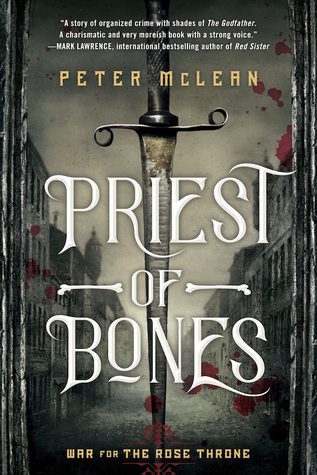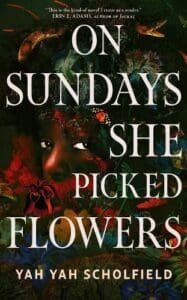Rating: 9/10
Synopsis
The war is over, and army priest Tomas Piety heads home with Sergeant Bloody Anne at his side. But things have changed while he was away: his crime empire has been stolen and the people of Ellinburg–his people–have run out of food and hope and places to hide. Tomas sets out to reclaim what was his with help from Anne, his brother, Jochan, and his new gang: the Pious Men. But when he finds himself dragged into a web of political intrigue once again, everything gets more complicated.
As the Pious Men fight shadowy foreign infiltrators in the back-street taverns, brothels, and gambling dens of Tomas’s old life, it becomes clear:
The war is only just beginning.
Review
Priest of Bones is the first in the fantasy quartet War for the Rose Throne, and it packs a punch. With prose as sharp as a knife to the throat and a plot that’ll cut you in its bloody beats, it has everything a fantasy fan could want: from flashing, explosive battle scenes, layers of political intrigue and the promise of magic which seems distant until Billy the Boy chirps up.
In short, Tomas Piety returns home from the war, an army priest that’s had enough of fighting – or at least it seems that way from the flashing behind his eyes. The memories of battle that have scarred him. On his return to Ellinburg he finds out his business have been taken over by the Skanians. Because Tomas Piety is not only a priest, that’s a newer business to him, but he’s also a gang boss, leader of the Pious Men. A group who offered their protection to local business, who then consumed local business, and now want it back.
I was instantly gripped by the strong character voice here, Tomas reaches out and drags you in to Ellinburg, and his story. Where you step in the puddles of piss and dodge ladies of night with him, while he’s storming through streets on a mission to raid a business once his with Bloody Anne, his sergeant, and his estranged brother, Jochan, at his side. It’s gritty, straight-talking, and honest. It promotes a greyed worldview which also reflects what Tomas has been through, the history of war and hardship. It’s a voice strained raw with dark family history with subtle hints of something much worse, shared by the Piety brothers. And the unescapable effects that war has on someone: it is this facet that makes Tomas all the more believable. He’s not a man that’s invulnerable to his surroundings, nor is he a hero. He’s a man that only seems to just be keeping his head above water – although he’s someone who commands respect and outwardly is confident, there’s that secret insight we get as a reader where we know all is not well. And I love that about this character.
When I started this book, I had no idea there would be any magic in it at all. In fact, I’m sure someone who recommended it to be said there wasn’t a magic system (I’m a huge stickler for magic, so this is the reason I took so long to read) and to my surprise, subtle as it may be, there’s a highly intriguing system in the way of the Cunning. Also, foreign magicians, which reminded me of the Powder Mage Trilogy, and some very grotesque uses of said system. Really it is by no means the backbone of the story, it’s just there. But it has enough surprise and awe in it that I wouldn’t want to go into too much detail. Only that, if someone tells you there’s no magic in this, they’re wrong. And it’s great!
Overall, if you like grit, magic, and political intrigue, this would be a book for you. I certainly loved it and have moved straight on to the audiobook of the second. It’s very well narrated if that’s the way you like to consume books.





Leave a Reply